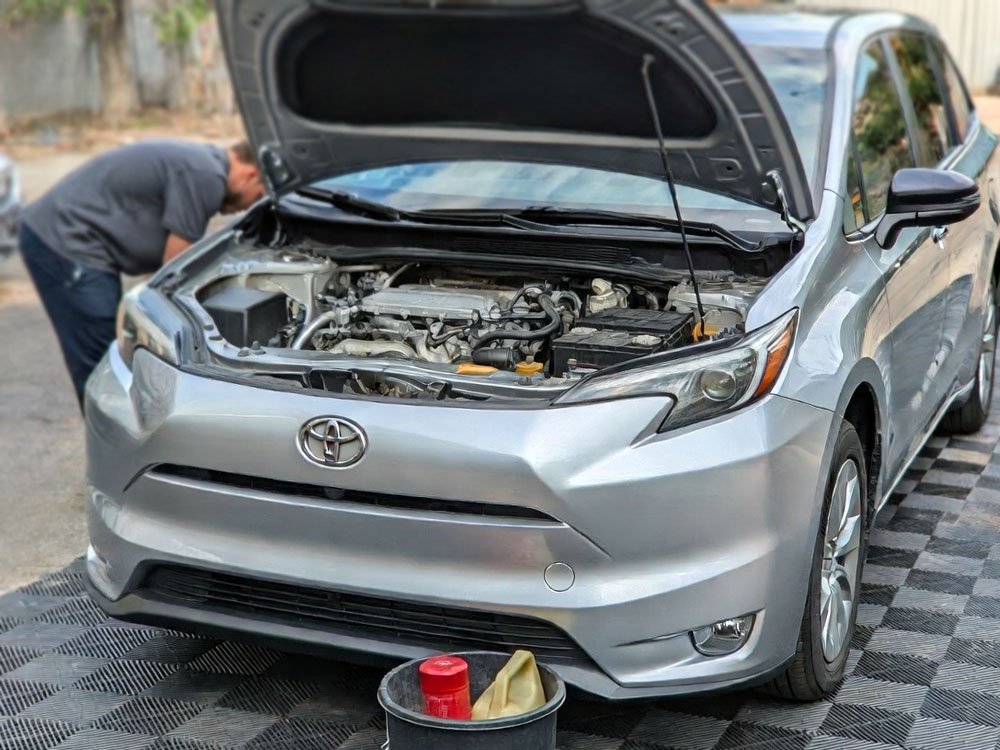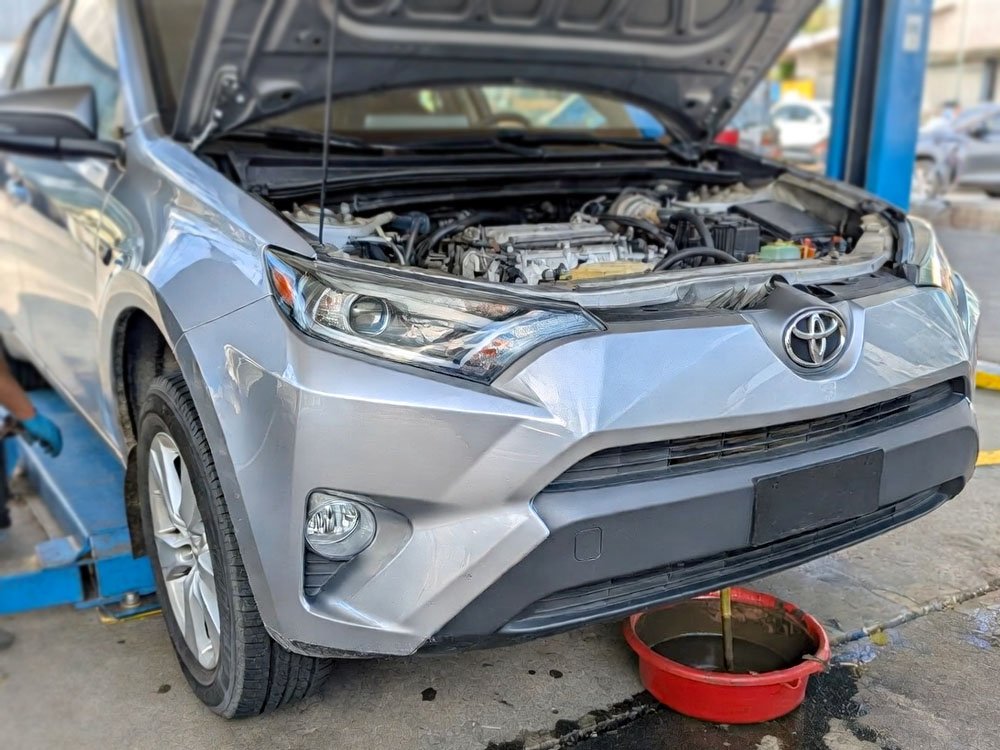As an Amazon Associate, I earn from qualifying purchases at no extra cost to you.
What Happens If You Over-Tighten an Oil Filter?
Changing your car’s oil is one of the most important things you can do to keep your engine running smoothly. But when it comes to tightening the oil filter, there’s a lot of confusion about just how tight is tight enough. If you’re like many people, you might be tempted to really crank down on that oil filter to make sure it’s secure. But, as you might guess, over-tightening an oil filter can cause serious issues. So, let’s dive into what really happens when you over-tighten an oil filter and why it can be a problem.
What Happens If You Over-Tighten an Oil Filter?
The oil filter on your car is a small but important part of the engine. It works to keep the oil clean by trapping dirt and debris before it flows through the engine. When you replace your oil filter, you need to screw it on tightly enough to make sure it stays in place. But if you over-tighten it, you could be setting yourself up for some major headaches.
Over-tightening an oil filter can cause a range of issues, from damaging the filter to causing leaks. But what does that mean for your car? Let’s break down the potential problems that could arise if you turn that filter too tight.
1. Stripped Threads and Damage to the Oil Filter
One of the biggest risks of over-tightening an oil filter is that you could strip the threads on the filter or the mounting surface on the engine. The oil filter is designed to fit tightly but not so tight that it gets crushed or damaged. If you tighten the filter too much, the threads can wear down, making it harder to remove the filter next time you change the oil.
The threads are important because they ensure a tight seal between the filter and the engine. If these threads are damaged, you might have trouble getting a good seal, which could lead to oil leaks or even a loose filter that could fall off.
2. Oil Leaks and Loss of Pressure
Another big issue caused by over-tightening the oil filter is that it can cause oil leaks. When you crank the filter on too tight, it can distort the gasket inside the filter, which is meant to create a seal between the filter and the engine. If the gasket is damaged or deformed, oil can leak out. Over time, these leaks could lead to a drop in oil pressure, and a low oil level can quickly turn into a much bigger problem for your engine.
The pressure inside your engine is important to keep the oil flowing smoothly and lubricating all the moving parts. If you have a leak, oil won’t be circulating properly, and that could cause severe engine damage.
3. Difficulty in Removing the Filter Later
If you over-tighten the filter, you might end up in a sticky situation when it's time for the next oil change. The filter could become so tightly attached to the engine that it's nearly impossible to remove. Trying to remove an over-tightened filter could damage the filter or the engine mounting area, leading to more repairs. It can even be dangerous if you're using tools to try and get the filter off.
This is why it's important to know how tight is enough. You don't need to use a wrench to tighten the filter as hard as you can. Instead, it's usually recommended to hand-tighten the filter. Tightening it a little bit more with a wrench is okay, but over-tightening is a big no-no.
How to Properly Tighten an Oil Filter
Now that we know the risks of over-tightening an oil filter, let’s talk about how to do it correctly. Properly tightening the oil filter will help ensure it stays in place without causing damage to the filter, engine, or yourself.
1. Hand-Tighten the Oil Filter
The best way to tighten an oil filter is to hand-tighten it. Most oil filters have a rubber seal that is designed to create a tight enough fit by hand. Simply screw the filter onto the mounting point on the engine and turn it until you feel resistance. You want the filter to be snug but not overly tight.
If you're using an oil filter wrench or any other tool to tighten the filter, make sure not to go overboard. Tighten it just enough to ensure it's secure, but avoid putting too much pressure on it.
2. Use the Manufacturer’s Instructions
Different cars and oil filters have different requirements, so it's important to follow the instructions that come with the filter or your car's manual. Some filters may require slightly more tightening, but they usually still only need a little extra hand-tightening to secure them properly.
If you're unsure, it's always a good idea to refer to the instructions that came with the oil filter. Most oil filter manufacturers will include detailed guidelines on how to install the filter correctly, including how tight it should be.
3. Avoid Using Too Much Force
It might be tempting to really tighten that filter to make sure it doesn't come loose, but using too much force is a bad idea. Remember, you’re working with rubber seals and metal parts that can be damaged with too much pressure. As a general rule of thumb, tighten the filter to a point where it feels secure, but don't go beyond that. The goal is to avoid any leaks, not to crush the filter into place.
Signs You've Over-Tightened the Oil Filter
Even if you’re careful, it's still possible to accidentally over-tighten the oil filter. If you’re unsure whether you've gone too far, here are some signs to watch out for.
1. Oil Leaks
As mentioned earlier, one of the most common signs that you've over-tightened the oil filter is oil leaking from around the filter. If you see oil dripping or puddling underneath your car after you’ve changed the oil, it's a strong indication that the filter wasn't sealed properly. This could be caused by the gasket inside the filter being damaged, which might have happened from over-tightening.
2. Difficulty Removing the Filter
If you're having trouble removing the oil filter during your next oil change, it might be because you tightened it too much the last time. A filter that's too tight can be very hard to remove, especially if the threads or mounting surface have been damaged. If you find yourself using excessive force to remove the filter, it's a good idea to check whether it was over-tightened before.
3. Low Oil Pressure
Another possible sign of over-tightening is low oil pressure. If the filter is too tight, it could cause the oil to leak out, resulting in low oil levels and a drop in pressure. If you notice that your oil pressure is lower than usual, or if the oil warning light comes on, it could be a sign that there's an issue with the oil filter.
Final Words
I hope this article helped you understand the importance of properly tightening your oil filter. Over-tightening can cause oil leaks, damage to the filter, and even make it harder to remove the filter next time. Just hand-tightening the filter is usually all you need to do to ensure a secure fit. Keep these tips in mind, and your oil changes will be smooth sailing.
Frequently Asked Questions
Is it bad to over-tighten an oil filter?
Yes, over-tightening an oil filter can cause damage to the filter, strip the threads, and create oil leaks. It's best to hand-tighten it properly.
Can over-tightening an oil filter cause oil leaks?
Yes, over-tightening can distort the rubber seal inside the filter, leading to oil leaks. This can cause a drop in oil pressure and engine damage.
Do I need to use a wrench to tighten the oil filter?
You don't usually need a wrench to tighten the oil filter. Hand-tightening is typically enough. A wrench can be used to give it a small extra turn if necessary, but avoid over-tightening.
Is it possible to fix an over-tightened oil filter?
If you’ve over-tightened an oil filter, you may need to replace it and check for any damage to the mounting area. Always follow the recommended torque specifications.
Can over-tightening damage the engine?
Yes, if the oil filter is over-tightened, it can lead to oil leaks, causing a drop in oil pressure and risking serious damage to the engine over time.
Do I need to worry about over-tightening the filter during my oil change?
Yes, it’s important to avoid over-tightening the filter. Doing so can lead to leaks, difficulty removing the filter, and potential engine issues. Be gentle when tightening.
Can an oil filter be too tight to remove?
Yes, if an oil filter is over-tightened, it can be very difficult to remove. This may require special tools and could damage the filter or engine threads.
Is it safe to change the oil filter yourself?
Yes, it is safe to change the oil filter yourself if done properly. Just make sure to follow the correct steps and avoid over-tightening the filter.











